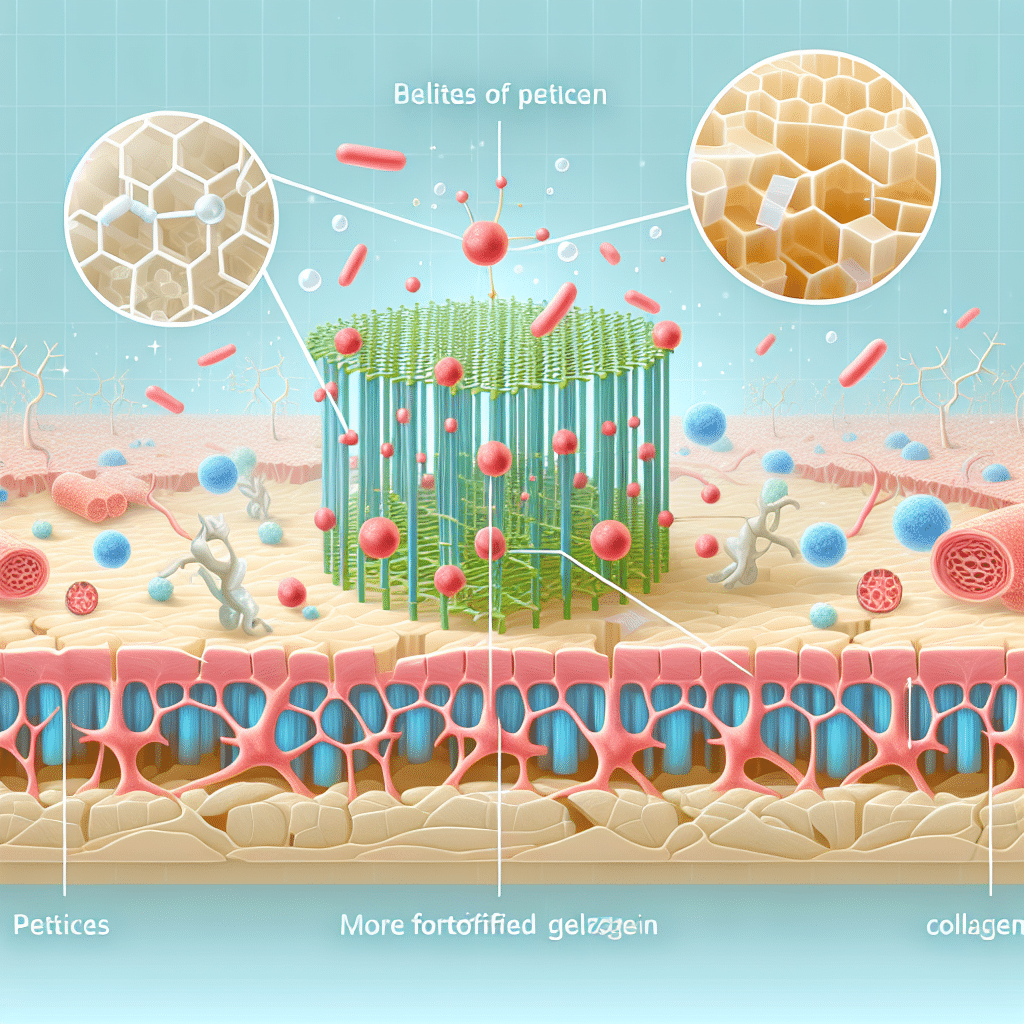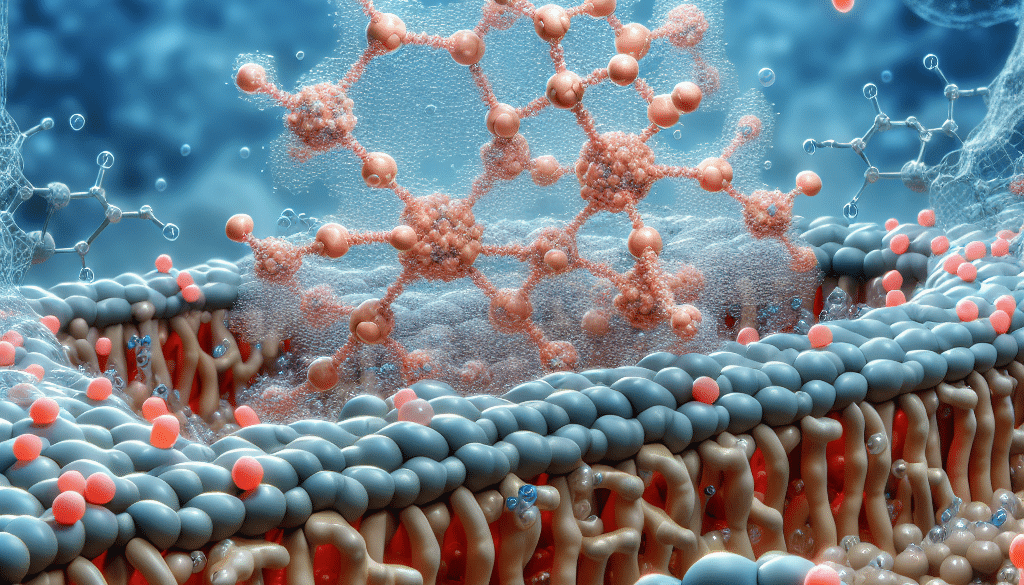Do Peptides Build Collagen?
-
Table of Contents
- Peptides and Collagen Synthesis: Unveiling the Connection
- Understanding Collagen and Its Importance
- Peptides: The Building Blocks of Proteins
- Do Peptides Build Collagen?
- The Role of Collagen Peptides
- Scientific Evidence Supporting Peptides for Collagen Production
- Topical Peptides and Skin Collagen
- Types of Topical Peptides
- Factors Affecting Peptide Efficacy
- Conclusion: The Collagen-Peptide Connection
- ETprotein: Your Source for Quality Protein Products
Peptides and Collagen Synthesis: Unveiling the Connection

Collagen is the most abundant protein in the human body, playing a crucial role in maintaining the structure and integrity of our skin, bones, and connective tissues. As we age, our bodies produce less collagen, leading to signs of aging such as wrinkles and joint pain. This has spurred interest in finding ways to stimulate collagen production, with peptides emerging as a promising solution. In this article, we delve into the science behind peptides and their role in building collagen.
Understanding Collagen and Its Importance
Collagen is a structural protein that provides strength and elasticity to various parts of the body. It is composed of amino acids, which are the building blocks of all proteins. There are several types of collagen, but types I, II, and III are the most prevalent in the human body, with type I being the most abundant.
- Type I Collagen: Found in skin, tendons, and bones.
- Type II Collagen: The main component of cartilage.
- Type III Collagen: Common in muscles and blood vessels.
Collagen synthesis is a complex process that requires specific amino acids, vitamins, and minerals. Over time, the body’s ability to produce collagen decreases, leading to the common signs of aging.
Peptides: The Building Blocks of Proteins
Peptides are short chains of amino acids linked by peptide bonds. They are essentially small fragments of proteins that can be absorbed more easily by the body. Peptides serve various functions, including signaling cells to perform specific actions, such as producing more collagen.
Do Peptides Build Collagen?
The short answer is yes, peptides can stimulate collagen production in the body. There are specific peptides, known as collagen peptides or bioactive peptides, which have been shown to have a direct effect on collagen synthesis.
The Role of Collagen Peptides
Collagen peptides are derived from animal or fish collagen and are broken down into smaller, more easily digestible forms. When consumed, these peptides can send signals to cells to increase the production of collagen. This process can help to replenish the collagen that is lost through aging or damage.
Scientific Evidence Supporting Peptides for Collagen Production
Several studies have demonstrated the effectiveness of peptides in promoting collagen production. For example:
- A study published in the Journal of Cosmetic Dermatology found that collagen peptides can significantly increase skin hydration and collagen density.
- Research in the International Journal of Medical Sciences indicated that collagen peptides could improve the symptoms of osteoarthritis by promoting the synthesis of extracellular matrix proteins, including type II collagen.
These studies suggest that peptides can be a valuable tool in boosting collagen levels in the body, potentially improving skin health and joint function.
Topical Peptides and Skin Collagen
Aside from dietary supplements, peptides are also used in topical skincare products. These peptides can penetrate the skin’s outer layer and signal the cells to produce more collagen, leading to improved skin texture and reduced wrinkles.
Types of Topical Peptides
There are several types of peptides used in skincare, each with its own mechanism for supporting collagen synthesis:
- Signal Peptides: Encourage skin cells to produce more collagen.
- Carrier Peptides: Deliver trace elements necessary for collagen production.
- Enzyme-Inhibitor Peptides: Slow down the breakdown of collagen.
Products containing these peptides can be an effective part of an anti-aging skincare regimen.
Factors Affecting Peptide Efficacy
While peptides have the potential to boost collagen production, their efficacy can be influenced by several factors:
- Peptide Quality: The source and purity of the peptides can affect their ability to stimulate collagen synthesis.
- Formulation: The formulation of peptide-containing products, including the presence of other ingredients that support collagen production, is crucial.
- Dosage: The concentration of peptides in a product can determine its effectiveness.
- Individual Factors: Age, lifestyle, and skin type can all influence how well peptides work for an individual.
Conclusion: The Collagen-Peptide Connection
In conclusion, peptides play a significant role in stimulating collagen production in the body. Whether consumed as dietary supplements or applied topically in skincare products, peptides can signal the body to create more collagen, potentially reversing some signs of aging and improving overall skin and joint health. However, the quality of peptides and the formulation of products containing them are critical factors in their effectiveness.
ETprotein: Your Source for Quality Protein Products
If you’re looking to incorporate peptides into your diet or skincare routine, ETprotein offers a range of high-quality protein products that can support your collagen synthesis needs. Their offerings include organic plant-based proteins that are non-GMO and allergen-free, ensuring you receive the best in terms of purity and effectiveness.
ETprotein’s commitment to excellence makes them a trusted supplier for those seeking to enhance their health and wellness through the power of peptides and proteins. To explore their products and learn more about how they can benefit your collagen production, contact ETprotein today.
About ETprotein:
ETprotein, a reputable protein and L-(+)-Ergothioneine (EGT) Chinese factory manufacturer and supplier, is renowned for producing, stocking, exporting, and delivering the highest quality organic bulk vegan proteins and L-(+)-Ergothioneine. They include Organic rice protein, clear rice protein, pea protein, clear pea protein, watermelon seed protein, pumpkin seed protein, sunflower seed protein, mung bean protein, peanut protein, and L-(+)-Ergothioneine EGT Pharmaceutical grade, L-(+)-Ergothioneine EGT food grade, L-(+)-Ergothioneine EGT cosmetic grade, L-(+)-Ergothioneine EGT reference grade and L-(+)-Ergothioneine EGT standard. Their offerings, characterized by a neutral taste, non-GMO, allergen-free attributes, with L-(+)-Ergothioneine purity over 98%, 99%, cater to a diverse range of industries. They serve nutraceutical, pharmaceutical, cosmeceutical, veterinary, as well as food and beverage finished product distributors, traders, and manufacturers across Europe, USA, Canada, Australia, Thailand, Japan, Korea, Brazil, and Chile, among others.
ETprotein specialization includes exporting and delivering tailor-made protein powder and finished nutritional supplements. Their extensive product range covers sectors like Food and Beverage, Sports Nutrition, Weight Management, Dietary Supplements, Health and Wellness Products, and Infant Formula, ensuring comprehensive solutions to meet all your protein needs.
As a trusted company by leading global food and beverage brands and Fortune 500 companies, ETprotein reinforces China’s reputation in the global arena. For more information or to sample their products, please contact them and email sales(at)ETprotein.com today.












